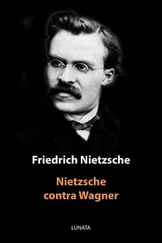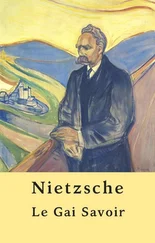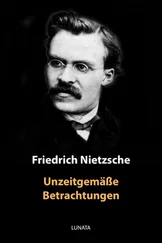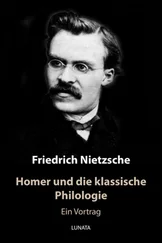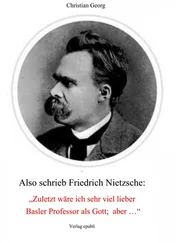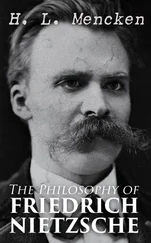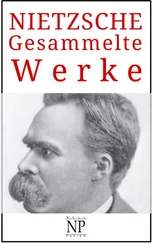Table of Contents
91.
Gloominess and pessimistic influence necessarily follow in the wake of enlightenment. Towards 1770 a falling-off in cheerfulness was already noticeable; women, with that very feminine instinct which always defends virtue, believed that immorality was the cause of it. Galiani hit the bull's eye: he quotes Voltaire's verse:
"Un monstre gai vaut mieux
Qu'un sentimental ennuyeux."
If now I maintain that I am ahead, by a century or two of enlightenment, of Voltaire and Galiani—who was much more profound, how deeply must I have sunk into gloominess! This is also true, and betimes I somewhat reluctantly manifested some caution in regard to the German and Christian narrowness and inconsistency of Schopenhauerian or, worse still, Leopardian Pessimism, and sought the most characteristic form (Asia). But, in order to endure that extreme Pessimism (which here and there peeps out of my Birth of Tragedy), to live alone "without God or morality," I was compelled to invent a counter-prop for myself. Perhaps I know best why man is the only animal that laughs: he alone surfers so excruciatingly that he was compelled to invent laughter. The unhappiest and most melancholy animal is, as might have been expected, the most cheerful.
92.
In regard to German culture, I have always had a feeling as of decline. The fact that I learned to know a declining form of culture has often made me unfair towards the whole phenomenon of European culture. The Germans always follow at some distance behind: they always go to the root of things, for instance:—
Dependance upon foreigners; Kant —Rousseau, the sensualists, Hume, Swedenborg.
Schopenhauer —the Indians and Romanticism, Voltaire.
Wagner —the French cult of the ugly and of grand opera, Paris, and the flight into primitive barbarism (the marriage of brother and sister).
The law of the laggard (the provinces go to Paris, Germany goes to France).
How is it that precisely Germans discovered the Greek (the more an instinct is developed, the more it is tempted to run for once into its opposite).
Music is the last breath of every culture.
93.
Renaissance and Reformation. —What does the Renaissance prove? That the reign of the "individual" can be only a short one. The output is too great; there is not even the possibility of husbanding or of capitalising forces, and exhaustion sets in step by step. These are times when everything is squandered, when even the strength itself with which one collects, capitalises, and heaps riches upon riches, is squandered. Even the opponents of such movements are driven to preposterous extremes in the dissipation of their strength: and they too are very soon exhausted, used up, and completely sapped.
In the Reformation we are face to face with a wild and plebeian counterpart of the Italian Renaissance, generated by similar impulses, except that the former, in the backward and still vulgar North, had to assume a religious form—there the concept of a higher life had not yet been divorced from that of a religious one.
Even the Reformation was a movement for individual liberty; "every one his own priest" is really no more than a formula for libertinage. As a matter of fact, the words "Evangelical freedom" would have sufficed—and all instincts which had reasons for remaining concealed broke out like wild hounds, the most brutal needs suddenly acquired the courage to show themselves, everything seemed justified ... men refused to specify the kind of freedom they had aimed at, they preferred to shut their eyes. But the fact that their eyes were closed and that their lips were moistened with gushing orations, did not prevent their hands from being ready to snatch at whatever there was to snatch at, that the belly became the god of the "free gospel," and that all lusts of revenge and of hatred were indulged with insatiable fury.
This lasted for a while: then exhaustion supervened, just as it had done in Southern Europe; and again here, it was a low form of exhaustion, a sort of general ruere in servitium .... Then the disreputable century of Germany dawned.
94.
Chivalry —the position won by power: its gradual break-up (and partial transference to broader and more bourgeois spheres). In the case of Larochefoucauld we find a knowledge of the actual impulses of a noble temperament—together with the gloomy Christian estimate of these impulses.
The protraction of Christianity through the French Revolution. The seducer is Rousseau; he once again liberates woman, who thenceforward is always represented as ever more interesting— suffering. Then come the slaves and Mrs. Beecher-Stowe. Then the poor and the workmen. Then the vicious and the sick—all this is drawn into the foreground (even for the purpose of disposing people in favour of the genius, it has been customary for five hundred years to press him forward as the great sufferer!). Then comes the cursing of all voluptuousness (Baudelaire and Schopenhauer), the most decided conviction that the lust of power is the greatest vice; absolute certainty that morality and disinterestedness are identical things; that the "happiness of all" is a goal worth striving after ( i.e., Christ's Kingdom of Heaven). We are on the best road to it: the Kingdom of Heaven of the poor in spirit has begun.—Intermediate stages: the bourgeois (as a result of the nouveau riche ) and the workman (as a result of the machine).
Greek and French culture of the time of Louis XIV. compared. A decided belief in oneself. A leisure-class which makes things hard for itself and exercises a great deal of self-control. The power of form, the will to form oneself. "Happiness" acknowledged as a purpose. Much strength and energy behind all formality of manners. Pleasure at the sight of a life that is seemingly so easy. The Greeks seemed like children to the French.
95.
The Three Centuries.
Their different kinds of sensitiveness may perhaps be best expressed as follows:—
Aristocracy : Descartes, the reign of reason, evidence showing the sovereignty of the will .
Feminism : Rousseau, the reign of feeling, evidence showing the sovereignty of the senses; all lies.
Animalism : Schopenhauer, the reign of passion, evidence showing the sovereignty of animality, more honest, but gloomy.
The seventeenth century is aristocratic, all for order, haughty towards everything animal, severe in regard to the heart, "austere," and even free from sentiment, "non-German," averse to all that is burlesque and natural, generalising and maintaining an attitude of sovereignty towards the past for it believes in itself. At bottom it partakes very much of the beast of prey, and practises asceticism in order to remain master. It is the century of strength of will, as also that of strong passion.
The eighteenth century is dominated by woman, it is gushing, spiritual, and flat; but with intellect at the service of aspirations and of the heart, it is a libertine in the pleasures of intellect, undermining all authorities; emotionally intoxicated, cheerful, clear, humane, and sociable, false to itself and at bottom very rascally....
The nineteenth century is more animal, more subterranean, hateful, realistic, plebeian, and on that very account "better," "more honest," more submissive to "reality" of what kind soever, and truer ; but weak of will, sad, obscurely exacting and fatalistic. It has no feeling of timidity or reverence, either in the presence of "reason" or the "heart"; thoroughly convinced of the dominion of the desires (Schopenhauer said "Will," but nothing is more characteristic of his philosophy than that it entirely lacks all actual willing ). Even morality is reduced to an instinct ("Pity").
Читать дальше



